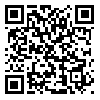

BibTeX | RIS | EndNote | Medlars | ProCite | Reference Manager | RefWorks
Send citation to:
URL: http://hcjournal.arums.ac.ir/article-1-637-en.html
Background& objectives: Memory deficit is common problem in diseases with brain injury, including stroke. Rehabilitation of these patients could effect on reduction complain and patients concerns. One example of interventions that could facilitate patient recovery is "multi-sensory stimulation". The aim of this study was to determine the effect of multi-sensory stimulation on the memory status in patients with ischemic stroke.
Methods: This study was a quasi experimental study. Study population was all patients with stroke in the Ardabil city. Total of 60 eligible patients were selected and after using blocking method of random allocation inter to experimental and control groups. Experimental group experienced sensory stimulation of some sense that was performed for 6 weeks. Simple sampling method with regarding the eligibility criteria was used. The control group received only common treatment of stroke. Recent and remote memory of two groups were assessed with a self- prepared questionnaire that its validity and reliability was obtained, and interview method were used to complete questionnaire. Then the data with using descriptive and analytic statistics (mean and standard deviation, and K square test, Fisher exact test, independent t test, repeated measures analysis, and post hoc tests) were analyzed.
RRDD Results: The results showed that there were no statistically significant difference in recent memory scores in one week (p=0.082) and 6 weeks after the intervention (p=0.15), and also between the remote memory scores in one week (p=0.51) and 6 weeks after the intervention (p=0.096). The repeated measures analysis, and its following post hoc tests showed that with passing time in recent memory scores; the within groups difference (p=0.000) have been significant, and between groups difference (p=0.247) have been not significant. And also with passing time in remote memory scores; the within groups difference (p=0.002) have been significant, and between groups difference (p=0.61) have been not significant. This indicates that an increase in the recent and remote memory scores in different time periods of the study in both groups were due to passing the time and performing this intervention has not been increased recent and remote memory scores in experimental group than the control group and the intervention has not been statistically significant.
Conclusion: Based on the findings of this study multi-sensory stimulation for 6 weeks in patients with stroke cannot lead to improve patients memory; studies with larger sample sizes and follow-up stroke patients after this intervention in a longer time is recommended.
| Rights and permissions | |
 |
This work is licensed under a Creative Commons Attribution-NonCommercial 4.0 International License. |


